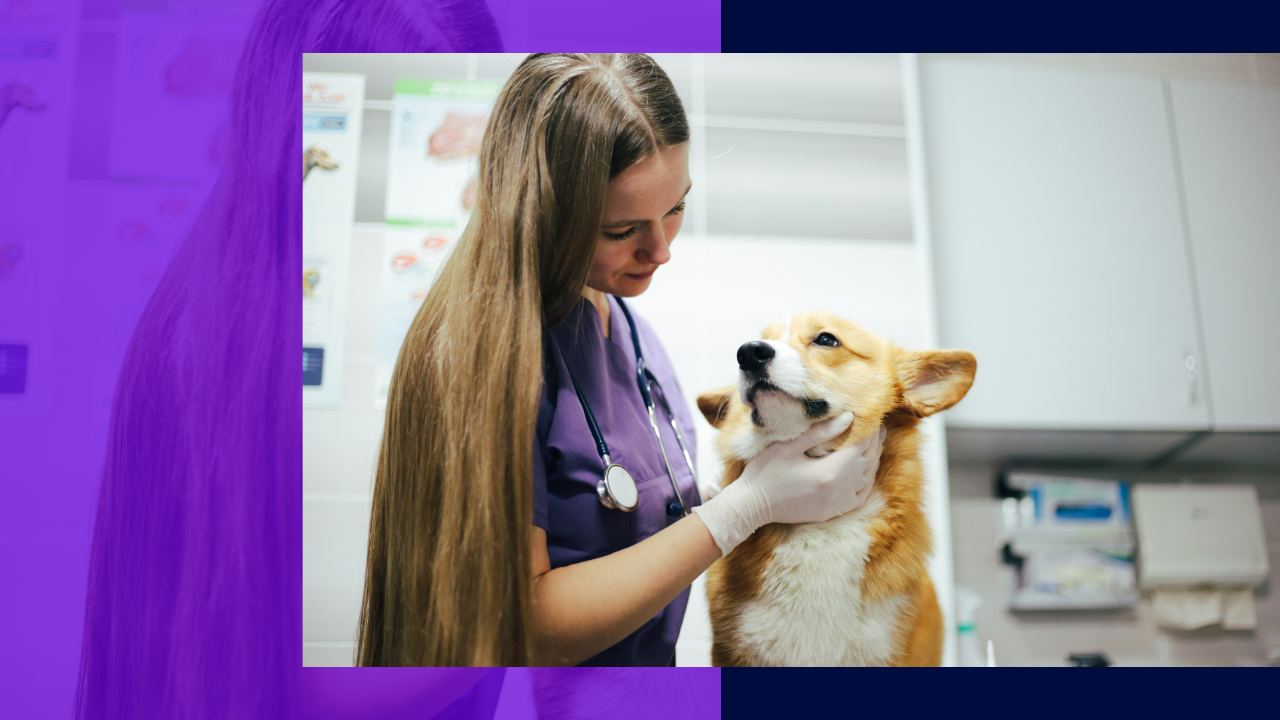Building a strong veterinary receptionist team

As any seasoned veterinary practice owner knows, the heartbeat of a successful clinic doesn’t lie only in the medical expertise of its staff. It’s also in the warm welcome and efficient support provided by its frontline heroes – the veterinary receptionists.
These multitasking maestros are the unsung champions of client satisfaction. They serve as the gatekeepers of first impressions, the soothing voices in times of pet-related crises, and the organizational wizards behind the scenes.
Their impact ripples through the daily operations of the practice, from setting the tone for each client interaction to ensuring that the patient flow remains smooth and seamless.
Let’s explore the vital role, unique strengths, and profound effects of building strong veterinary receptionist teams in your practice.
The role of a veterinary receptionist
A veterinary receptionist is the first point of contact in a veterinary practice, playing a crucial role in managing both administrative tasks and client relations.

Vet receptionists greet clients, answer phones, and schedule appointments, ensuring that the practice’s schedule runs smoothly.
Beyond these duties, they often handle billing, maintain patient records, and provide information to pet owners about services, procedures, and general care.
These experts also manage the practice’s emotional atmosphere, offering empathy and support to anxious pet owners. They coordinate with the veterinary team to ensure that all clients and their pets receive timely, compassionate care.
What makes an ideal veterinary receptionist?
A reliable veterinary receptionist possesses a variety of qualities that are essential for success in their role.
Here are some key qualities and their importance:
Communication skills
Veterinary receptionists must be excellent communicators. They interact with clients, veterinarians, and support staff daily, often serving as the bridge between the pet owner and the medical team.
Clear, compassionate communication is key to ensuring that clients feel understood and valued and that the team is on the same page regarding patient care.
Empathy and compassion
Dealing with worried pet owners and sick or injured animals requires a great deal of empathy and patience. An outstanding veterinary receptionist understands the emotional stress clients may be under and responds with kindness and understanding.
Vet receptionists help to create a calming atmosphere, which can make a significant difference in the overall client experience.
Organizational and multitasking abilities
Veterinary practices are busy environments, often handling multiple appointments, emergencies, and administrative tasks simultaneously.
Skilled veterinary receptionists must be highly organized and capable of managing a variety of tasks without compromising accuracy or efficiency. Their ability to prioritize and multitask ensures that the practice runs smoothly, even during peak hours.
Problem-solving skills
Unexpected situations can arise in a veterinary practice, such as emergencies or scheduling conflicts.
Veterinary receptionists think quickly on their feet, make informed decisions, and find creative solutions to address these challenges. At the same time, they prioritize the well-being of the pets and the needs of the clients.
Teamwork and collaboration
A veterinary receptionist is part of a larger team, working closely with veterinarians, technicians, and other support staff. A strong candidate must be a team player who understands the importance of collaboration.
Vet receptionists contribute to a positive work environment by being reliable, supportive, and willing to assist wherever needed.

Advantages of strong veterinary receptionist teams
Strong veterinary receptionist teams are crucial in the smooth operation and success of a veterinary practice.
Here are some key advantages of having a strong veterinary receptionist team:
Enhanced client experience and satisfaction
A strong veterinary receptionist team is the frontline of client interactions, creating positive first impressions and maintaining a welcoming atmosphere.
Satisfied clients are more likely to return to the practice and recommend it to others, which can lead to increased client loyalty and referrals.
Improved practice efficiency
Strong receptionist teams excel in managing appointments, coordinating with veterinary staff, and keeping the practice running smoothly.
Their organizational skills and ability to multitask ensure that schedules are optimized, waiting times are minimized, and administrative tasks are handled accurately.
Client communication consistency
Strong receptionist teams maintain consistency in client communication and record-keeping, which is crucial for providing high-quality care. They ensure that patient records are up-to-date, appointments are accurately scheduled, and client inquiries are promptly addressed.
This consistency helps build trust with clients and ensures that the practice operates smoothly, even as it grows.
Revenue generation
Receptionists can contribute to practice revenue by upselling services, promoting preventive care packages, and recommending additional products or services that benefit the pet’s health.
A proactive and well-trained receptionist team can help increase revenue through client education and promotion of value-added services.
Stronger team morale
A strong veterinary receptionist team contributes to a cohesive and collaborative work environment. By effectively communicating with veterinarians, technicians, and other support staff, they ensure that everyone is on the same page.
High morale among the receptionist team can also be contagious, leading to overall improved job satisfaction across the practice.
Why outsource a veterinary receptionist?
Outsourcing veterinary receptionists can offer numerous benefits to your practice.
Access to specialized talent and expertise
Outsourcing veterinary receptionists allows practices to tap into a pool of professionals with specialized skills and experience.
These receptionists are often trained specifically for the veterinary industry. They bring a deep understanding of client relations, appointment management, and the unique demands of working in a veterinary setting.
This expertise can enhance the quality of service provided to clients and improve overall practice efficiency.
Cost-effectiveness and scalability
Outsourcing can be a cost-effective solution for veterinary practices, particularly smaller ones or those with fluctuating workloads. Outsourcing a vet receptionist allows practices to reduce overhead costs associated with hiring, training, and managing in-house staff.
Additionally, outsourcing offers scalability, as it helps them easily adjust staffing levels based on demand without the long-term commitment of full-time employees.

Ensuring quality and cultural fit
While outsourcing offers many benefits, it’s important to ensure that the outsourced receptionist aligns with the practice’s values and culture. This includes understanding the practice’s specific needs and providing a level of service consistent with that of the in-house team.
Vetting the outsourcing provider and establishing clear communication channels help maintain quality and ensure a good cultural fit.
Focus on core veterinary services
By outsourcing reception duties, veterinary practices enables their in-house team to focus more on core services such as patient care and medical procedures.
This shift can lead to increased efficiency in clinical areas, allowing veterinarians and technicians to dedicate more time and attention to their primary responsibilities.







 Independent
Independent




